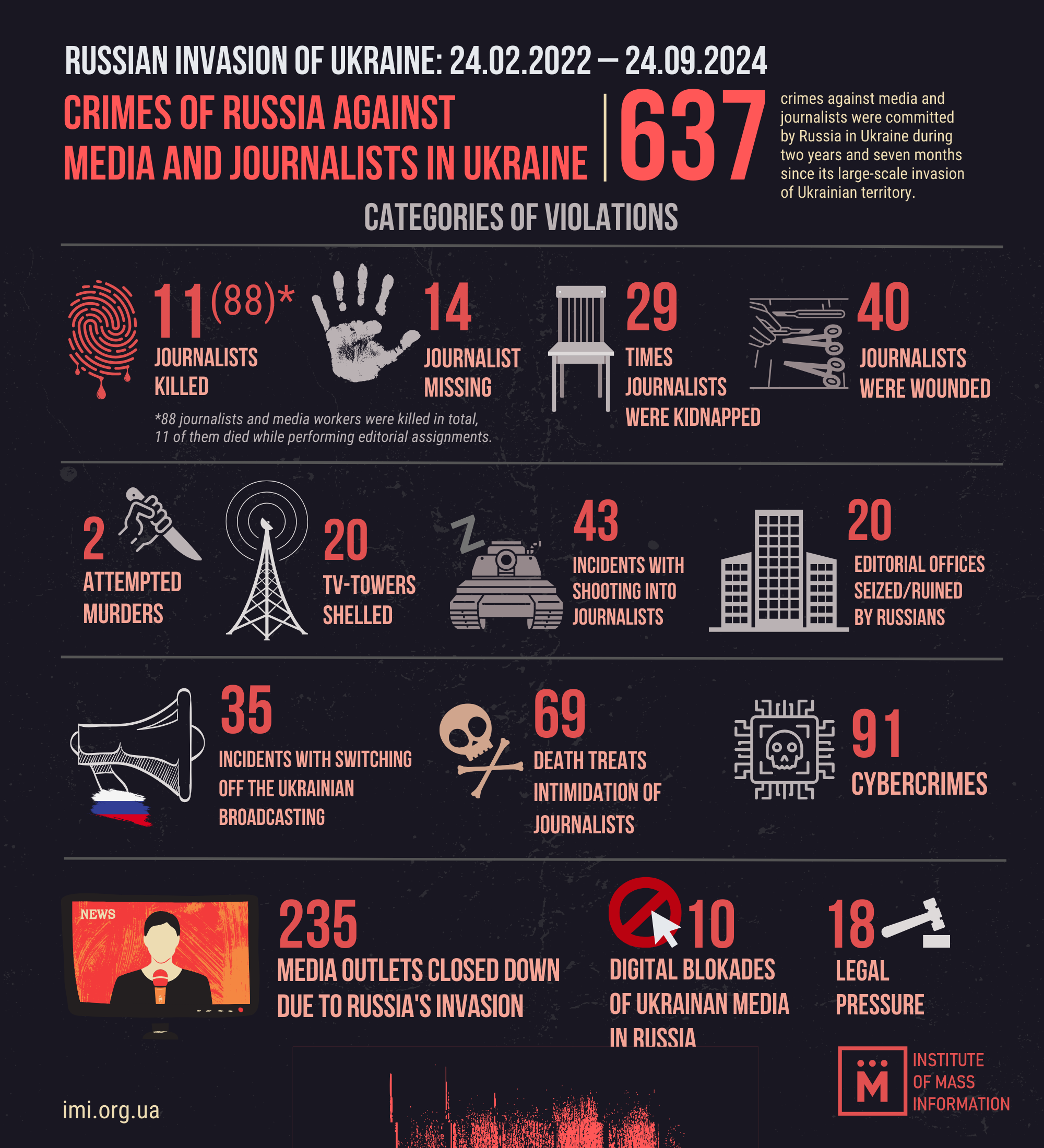In the 2 years and 7 months since the start of the full-scale invasion Russia committed 637 crimes against journalists and the media in Ukraine.
This is evidenced by the monthly monitoring of Russia’s crimes against journalists and the media by the Institute of Mass Information.
In August – September of 2024 the IMI recorded 13 crimes against the media and journalists committed by Russia: kidnapping journalists, legal pressure, cyber attacks, and disabling Ukrainian broadcasting.
The deaths of four media workers were reported during the month, one of which died while on assignment: Ryan Evans, a safety advisor with the UK news agency Reuters, who was killed by a Russian missile strike on the Sapphire Hotel in Kramatorsk on August 24.

Russia’s crimes against the media and journalists in Ukraine
Three media professionals were killed in action:
- Bohdan Zatula, a Kharkiv-based Novyny.LIVE correspondent who had been conscripted, was killed in a mass shelling strike on August 26.
- Pavlo Parkhomenko, a serviceman of the Ukrainian Armed Forces of Ukraine and Priamyi TV cameraman.
- Ihor Zakharov, a soldier and cameraman (previously with Ukraina TV and 1+1); his death was reported in September. Ihor had gone missing a year before that and his fate had been unknown. Recently his remains were discovered and the examination confirmed that it was him.
According to the IMI, as of September 24, 88 media workers were killed in Ukraine as a result of Russia’s full-scale aggression, 11 of whom died while reporting.
At least 4 journalists were injured in the Russian missile strike on Sapphire Hotel in Kramatorsk on August 24:
- Ivan Lyubysh-Kirdey – a Ukrainian journalist for Reuters who was hospitalized in a serious condition;
- Daniel Peleshchuk – a Reuters journalist who left the hospital after getting treatment;
- Victor Sayenko – a Reuters journalist who received non-lethal injuries;
- Monika Andruszewska – a Polish journalist with the Rafael Lemkin Center for Documenting Russian Crimes in Ukraine and a volunteer, who had cuts on her arm.
Furthermore, in late August the Russian troops targeted the car of the “1+1” filming crew led by the journalist Oleksandr Motorny with a drone. It happened as the team accompanied an evacuation bus near Pokrovsk. The explosion went off in front of the journalists’ car. TSN says that the media workers were unharmed.
Moreover, Russia’s Federal Security Service (FSB) opened cases against two journalists, accusing them of illegally crossing Russia’s border to report from Sudzha:
- 1+1 reporter Natalya Nahorna (Ukraine);
- DW correspondent Nick Connolly.
The websites of Hromadske and FREEDOM TV were hacked. The media outlets suspect Russian involvement in the attacks.
Due to the hostilities and the difficult safety situation in Hirnyk (Donetsk oblast), Hromadske Radio ceased broadcasting. In Pokrovsk (Donetsk region), a Russian shelling strike destroyed the broadcasting equipment used by Hromadske Radio and the local TV channel “Capri”.
Furthermore, the IMI added a new category to the Monitoring of Russia’s Crimes Against Journalists and the Media – assassination attempts. During the research period, experts recorded two cases of attempted assassination of journalists, targeting Dmytro Gordon and Odesa journalists.
Read more here.
The Institute of Mass Information (IMI) is a Ukrainian non-governmental media organization that has been operating since 1996. The IMI defends the rights of journalists, analyzes the media field and covers media-related events, fights propaganda and disinformation and has been providing media outlets with safety gear for trips to the combat zone since the start of the Russo–Ukrainian war in 2014.
The IMI carries out Ukraine’s only freedom of speech monitoring and keeps a list of high quality and sustainable online media outlets, documents Russia’s crimes against the media committed in the course of the war on Ukraine. The IMI has representatives in 20 oblasts of Ukraine and a network of “Mediabaza” hubs to provide journalists with continuous support. The IMI’s partners include Reporters Without Borders and Freedom House; the organization is a member of the International Organization for the Protection of Freedom of Expression (IFEX).
